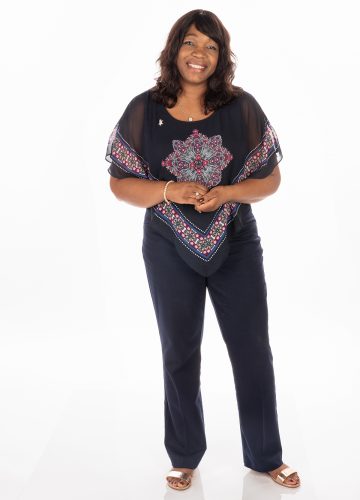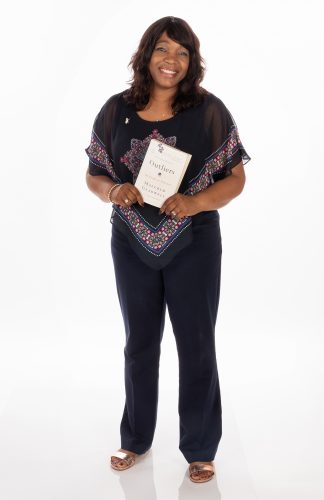Zoranna Taylor Jones ’98 (MS ’07) is a Mentor at Harris College
The director of the Harris Academic Resource Center discusses TCU’s STEM Scholar program and the importance of helping students succeed.
Zoranna Taylor Jones ’98 (MS ’07) is a Mentor at Harris College
The director of the Harris Academic Resource Center discusses TCU’s STEM Scholar program and the importance of helping students succeed.
What does the Academic Resource Center in the Harris College of Nursing & Health Sciences do?

Zoranna Taylor Jones ’98 (MS ’07) is the director of the Harris College Academic Resource Center. Photo by Glen E. Ellman
We do everything from recruiting and meeting with prospective students to academic advising. We provide academic coaching, workshops, career prep — so résumés, connecting students with employers, and then also preparing them for graduate school or employment.
We also try to build relationships and connections between students and faculty. Faculty can be scary, so we host different events, like a crawfish boil in the spring and a chili cook-off in the fall. We invite all Harris faculty, staff and students. It’s a fun environment.
You earned a doctorate in Public and Urban Administration. How did you end up in the Harris College?
My background is in nursing. I graduated from TCU with a degree in nursing in 1998, and I worked in a hospital for about four years. I came back to TCU in 2002 to work in the nursing department. I was originally the coordinator of recruitment, retention and alumni relations. Several years later, I was promoted to assistant director of recruitment and retention. In 2012, I was able to become the director of the Harris Academic Resource Center.
Are there any unique challenges associated with academic advising in the Harris College?
Nursing is a competitive major. It’s a rigorous major. A lot of students want to change into nursing after freshman year, and right now, we can’t accommodate all of them in the desired timeframe. If they meet the criteria to change into nursing, it may mean they have to stay here a little bit longer. We also have limited space in the hospitals and limited faculty. There are state mandates that dictate how many students can enroll per faculty member. Those things are a challenge to explain to a student or parent.
Since it is a rigorous major, sometimes people aren’t successful. They make it to senior year and must choose a different major. At that point, we help those students come up with an alternate plan — how to get out of TCU with a degree, something that they enjoy and can use.
You won the Wassenich Award for Mentoring in 2017 and received a standing ovation from your TCU colleagues. What does the award mean to you?
It was shock and awe. I was so happy to be there and on the stage. I’ve been at TCU for 17 years, and I love the students. I love this institution. I had a great experience here, and the mentors I had made the difference. Those people saw something in me. They provided this sincere, genuine warmth and concern in wanting the best for me. Because that was my experience, I want — in any way possible — for everyone to have the same experience.
TCU is a special place but it’s an expensive place. It’s a hard place, and so I do whatever I can to help a student reach their goals. But I’m also one that’s going to hold the student accountable. Everybody here has such great potential, but sometimes students need someone to believe in them, someone to hold them accountable, someone to remind them of what they said they wanted to do or why they are here.
With the mentor relationship, it has to be organic. You’re not going to connect with everybody. Not everyone is going to want to hear from you or like what you have to say. I feel like it’s just making a connection and then truly coming from a place of, “Let me help you get wherever it is you want to go.”
How do you continue to stay engaged with students after 17 years on the job?
Each generation is different, so advising students back in 2002 was a lot different than it is now. What I enjoy about this group is that they are more open. It doesn’t take as much to get the whole story or to learn about someone. Today’s students are very receptive to guidance.
TCU has a lot of initiatives for diversity, equity and inclusion, and seeing those programs coming to fruition makes me proud.
Zoranna Taylor Jones '98 (MS '07)
How has the university changed since you were a student?
It’s changed in a lot of ways. The number of students has grown. Our sports have improved. There are a lot of new programs and initiatives that I am a fan of, such as Comparative Race and Ethnic Studies and African American and Africana Studies. There are a lot of new student organizations for women and minority students in science. TCU has a lot of initiatives for diversity, equity and inclusion, and seeing those programs coming to fruition makes me proud.
You started the STEM Scholar program, which provides full scholarships for students from underrepresented groups studying science, technology, engineering or mathematics. How does one apply for the scholarship?
Incoming freshmen must meet scholarship criteria for the university. They also have to choose one of TCU’s selective STEM majors. Most of the recipients are currently in science and engineering and education, but we’re going to expand into business information systems and movement science. The students are preferably from groups underrepresented in STEM fields: students of color, first-generation students.
How did you start the program, how do you guide students, and why is it important?
When I was doing research for my dissertation, I was looking at existing STEM support systems at other institutions. Many of those had been in existence for over 25 years and had successful results. There’s a successful model out there, and TCU wants to increase diversity and improve academic rigor. So it made sense.

Zoranna Taylor Jones found Outliers by Malcolm Gladwell influential. Photo by Glen E. Ellman
There are a lot of students who are interested in STEM, but those courses are hard. If someone takes that first class and it doesn’t go as well as they want, they change majors. But we can stop them, get them in the door and say, “This is going to be hard, but here are some tools to prepare you.” If they stumble, we can be that encouraging person who says, “OK, let’s try again.”
This program is essentially created to do two things. One: provide academic support, so that’s academic advising, tutoring, mentorship. Two: the enrichment part. We are providing opportunities to go study abroad, opportunities for networking with industry professionals, opportunities for internships.
Why do you think STEM is so important, especially for underrepresented groups?
Think about what someone can do with science: research, working for the Centers for Disease Control and Prevention, being an entrepreneur, being a medical doctor. There are so many opportunities. The technology is endless: advancing computers, creating new software, even if it’s related to medicine. Now we have computers that help with operations. Who creates those?
If you’re a first-generation college student, and you’re coming from a nonprivileged background, being able to come into a place like TCU and get a degree in engineering and then go work for Lockheed or BNSF can literally be life-changing for you and your family.
What advice would you give to an incoming student thinking about pursuing STEM?
If they have a true interest, passion and drive to do it, then stick with it. It’s always hard for everybody in the beginning. Many departments, including the Harris Academic Resource Center, offer free tutoring. It’s not one of those things where they have to figure out everything on their own.
— Zach Martino
Editor’s Note: The questions and answers have been edited for length and clarity.

Your comments are welcome
Comments
Related reading:
Features
Female Equality in STEM Fields
Themes of lauded film Hidden Figures linger as conversations about gender bias continue, especially in STEM fields.
Features, Research + Discovery
Leading a Culture Change in Health Care
Faculty at the Harris College of Nursing & Health Sciences are helping fuse research with health care practice.
Features
Fellowship Program Trains Nurse Anesthetists to Treat Chronic Pain
The training focuses on alternative methods to help patients end their reliance on opioids.